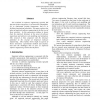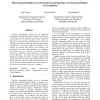235
click to vote
SIGSOFT
2012
ACM
13 years 9 months ago
2012
ACM
The RESER workshop provides a venue in which empirical software engineering researchers can discuss the theoretical foundations and methods of replication, as well as present the ...
102
click to vote
TAP
2010
Springer
14 years 12 months ago
2010
Springer
An important component of Empirical Software Engineering (ESE) research involves the measurement, observation, analysis and understanding of software engineering in practice. Resul...
104
click to vote
DAGSTUHL
2006
15 years 3 months ago
2006
We provide an assessment of the status of empirical software research by analyzing all refereed articles that appeared in the Journal of Empirical Software Engineering from its fir...
101
click to vote
CSMR
1999
IEEE
15 years 6 months ago
1999
IEEE
This paper describes a case study where SofTrack a Software Defect Report and Tracking System - was implemented using internet technology in a geographically distributed organizat...
112
click to vote
ISESE
2002
IEEE
15 years 7 months ago
2002
IEEE
Recently the awareness of the importance of replicating studies has been growing in the empirical software engineering community. The results of any one study cannot simply be ext...
APSEC
2002
IEEE
15 years 7 months ago
2002
IEEE
Our activities in software engineering typically fall into one of three categories, (1) to invent new phenomena, (2) to understand existing phenomena, and (3) to facilitate inspir...
111
click to vote
ISESE
2003
IEEE
15 years 7 months ago
2003
IEEE
One purpose of empirical software engineering is to enable an understanding of factors that influence software development. Surveys are an appropriate empirical strategy to gather...
120
click to vote
ISESE
2003
IEEE
15 years 7 months ago
2003
IEEE
Software Engineering studies run in classroom environments can and have made important contributions to empirical software engineering. Because the goal of such studies is to impr...
133
click to vote
ECSA
2007
Springer
15 years 8 months ago
2007
Springer
Empirical software engineering focuses on the evaluation of software engineering technologies, such as processes and tools, by comparing related sets of data. It has contributed a ...
ICECCS
2008
IEEE
15 years 8 months ago
2008
IEEE
Experimental replications are very important to the advancement of empirical software engineering. Replications are one of the key mechanisms to confirm previous experimental find...


